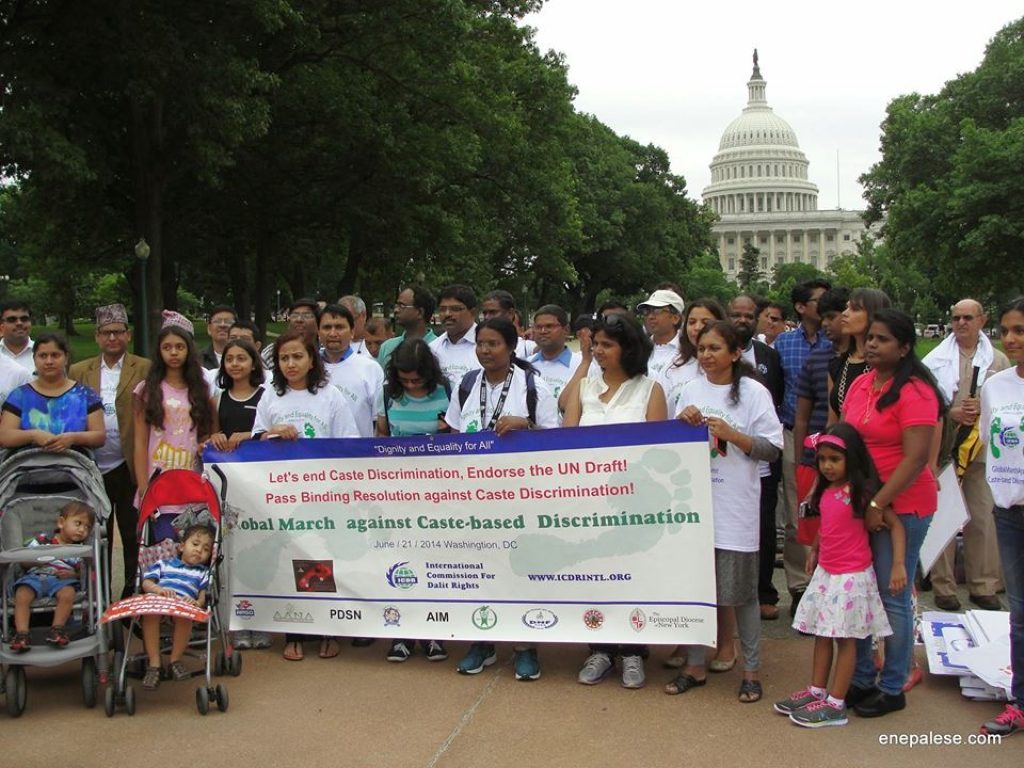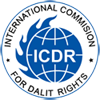
In 2014, along with Diaspora, Ambedkarite and inter/national organizations, for the first time in the history, we organized the Global March Against Caste-Based Discrimination in Washington D.C., particularly in front of the White House and US Congress. The objective of the Global March was to strengthen links among US and international organizations fighting caste or work and descent-based discrimination; and to urge US Congress to pass a law against Caste and All other Forms of Discrimination that expands the geographic scope of the House’s historic concurrent resolution on In 2015, ICDR hosted the First Global Conference on Dalit Rights and adopted the Dalit Rights Global Declaration 2015, a global framework to promote rights and dignity of Dalits, marginalized, and underprivileged population. We have also published reports that have helped spark grassroots, state, federal, and international policy reforms, inclusion and hold government accountable as well as corporations for social responsibility under law.
In 2015, ICDR worked to ensure rights and proportionate representation of Dalit, marginalized, and underprivileged population in the New Constitution of Nepal. The same year, ICDR’s work was acknowledged by the senior officers at the US Department of State. In the appreciation letter, the officer said “I am writing to thank you once again for helping us to better understand, and elevate the visibility of, caste discrimination in South Asia. In part because of your good work, we included a specific recommendation in the November 2015 cycle of the Nepal Universal Periodic Review (UPR) on engaging and addressing the needs of Dalits in disaster relief. This is a first for our Nepal engagement through the UN mechanism, and it has set an excellent precedent for the region.” In 2016, ICDR extended its pro-Bono public services focusing on low income families and immigrants in the U.S. Our public service activities include Access to Health, Workforce Development and Equal Employment Opportunity, and Referral programs. ICDR deals various equal and civil rights issues. Most recently, we filed motion before Equal Employment Opportunity Commission (EEOC) on the matter of reviewing the findings of New York State Division of Human Rights. Likewise, ICDR International has urged Department of Homeland Secretary (DHS), Honorable Kirstjen M. Nielsen to extend Temporary Protected Status (TPS) for Nepali nationals living in the United States.
EXPOSING AND CONFRONTING DISCRIMINATION
A. Overview:
Discrimination against Dalits and other caste-affected communities takes many forms: in education, employment, housing, personal security, and access to aid. Similarly, caste-based discrimination manifests differently in the United States than it does in South Asia. Governmental responses to Dalit discrimination, and protection from it are not consistent worldwide. ICDR confronts discrimination toward caste-affected and marginalized communities in three ways: identifying inequity in access to housing, education, and career opportunities; calling for policy change and justice; and by standing against prejudice in communities, schools, and political offices.
B. Relevant campaigns and issues:
Election monitoring</strong>: ICDR tracks how discrimination toward Dalits and other caste-affected groups has implications for local and national elections. The under-representation of certain castes due either to deliberate or systemic oppression has far-reaching consequences for the rights of marginalized people and their ability to achieve improve quality of life. Election monitoring represents another method by which ICDR can qualify how caste-affected groups are maligned in societies. (A useful example may be Dalit participation in the 2019 Indian elections.
B. Employment discrimination cases:
ICDR supports those impacted by caste-discrimination in the workplace by representing their interests to employers and in legal proceedings. (Include relevant examples from ICDR’s work. A prominent example is the Sikh Coalition v. Disney 2015. )
C. Resources and actions:
Fact sheet: Filing an EEOC charge, This fact sheet would provide information for impacted individuals and organizations for filing an Equal Employment Opportunity Commission (EEOC) charge for incidents of discrimination occurring in the United States. The fact sheet could also provide information about equivalent international processes for those located internationally.
Petitions
Mailing list
Donate
D. Community response/testimonials:
An individual who utilized ICDR resources or support to pursue an EEOC issue.
An individual who was impacted by caste-discrimination and supported by ICDR in mitigating the issue.
EMPOWERING THE COMMUNITY
A. Overview:
The progress made toward equality has largely been because of the dedication and commitment of the Dalit community. To further support the movement for equality, ICDR and its partners endeavor to work with Dalit and caste-affected communities to provide informational and educational tools so as to build the capacity of impacted groups to be partners in advocacy. These efforts will be complemented by those related to voting access and census representation that aim to increase visibility and inclusivity of Dalit communities.
B. Relevant campaigns and issues:
i. Second Global Conference on Dalit Rights 2020: The Second Global Conference on Dalit Rights will take place in 2020 in Kathmandu, Nepal and follows the Global March against Caste-based Discrimination and the First Global Conference on Dalit Rights, which took place in Washington, DC in 2014 and 2015, respectively. The aim of the Second Global Conference is to continue the work of identifying challenges and solutions for eliminating caste-based discrimination from caste-affected countries. (Add link when available.)
ii. Dalit YoungStars Initiative: The YoungStars initiative provides skill-oriented vocational training and public service preparatory courses for two hundred Dalit youth in Nepal.
iii. Defending Dalit Rights March: ICDR and the Global Conference Organizing Committee led the first Global Conference on Depending Dalit Rights March in March 2015 in Washington, DC. Dalit advocates and allies, from India, Nepal, Bangladesh, the UK, Norway, Canada, and throughout the U.S. came together to develop a strategic framework designed to mitigate and bring an end to caste-based discrimination.
C. Resources and actions:
i. Fact sheet: Successful local initiatives, This fact sheet should highlight successful initiatives and programs implemented by ICDR and/or within its network of local and national partners aimed at mitigating the impacts of caste-based discrimination and empowering Dalit and other caste-affected communities. This fact sheet would serve the dual purpose of bringing positive attention to these initiatives, while also sharing best practices for other entities focused on caste-based discrimination.
ii. Register for the Second Global Conference on Dalit Rights 2020 (Add link to registration portal, in addition to sharing functions for social media and email.)
iii. Mailing list
iv. Donate
D. Community response/testimonials: Testimonial from a participant of the YoungStars program who can speak to how he or she was positively impacted.
FIGHTING FOR JUSTICE
A. Overview:
Justice can only be achieved at both the grassroots and policy level. It is crucial to address the disparities present in the rights afforded to Dalit and other caste-affected communities versus those afforded to populations writ large, and it is often the case that such disparities need to be tackled at the highest levels via courts or legislation. ICDR advocates for the Dalit community on both a national and global scale, and through its network of lawyers provides caste-affected communities with pro-bono or low-cost legal services.
B. Relevant campaigns and issues:
Legal Services Program:
ICDR provides legal support to caste-affected communities through several pathways, including for rape survivors in Nepal and immigration issues. In Nepal, the ICDR-supported initiative assists with the full process of helping rape victims get justice from initial investigations, court litigation, and technical assistance to legal professionals and other support staff. ICDR’s legal support with regard to immigration includes petition filing, form, and interview support, and representation at hearings for all immigrants regardless of religion or background.
Campaign to Endorse UN Resolution A/HRC/11/CRP.
3: Draft Principles and Guidelines for the Effective Elimination of Discrimination Based on Work and Descent. ICDR joins other partners such as Human Rights Watch and the International Dalit Solidarity Network in the effort to eliminate caste-based discrimination in calling upon the Ending Ca International legislative progress, This fact sheet would provide a clear overview of the current legislative landscape with regard to the rights of Dalits and other caste-affected groups so as to detail the present and future of advocacy work on behalf of marginalized groups. The fact sheet can include examples such as the “Caste-based Discrimination and Untouchability Bill” adopted in Nepal in 2011, and the Equality Act adopted in Great Britain in 2013 which includes protections for Dalits in diaspora communities against discrimination.
Contact your representatives:
Information can be provided to link interested people with their senators, representatives, and ambassadors who have political platforms to advance the conversation and legislation regarding caste-based discrimination. This section should also include current information about legislative efforts, in addition to talking points.
Mailing list
Donate
D. Community response/testimonials:
A member of a community who received legal support from ICDR, how the support aided their work, and information about the issue that was being addressed.</span>
